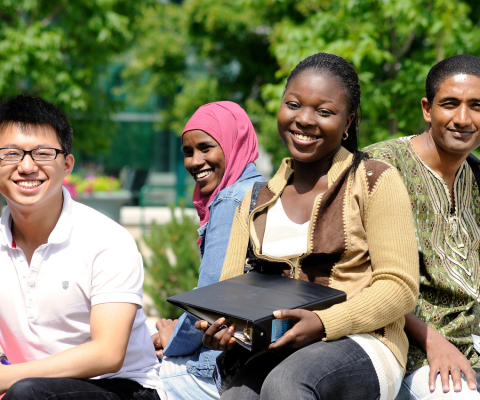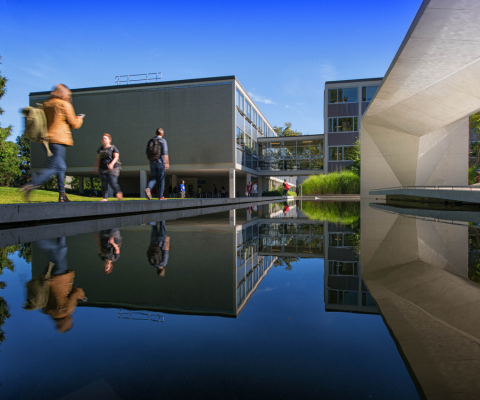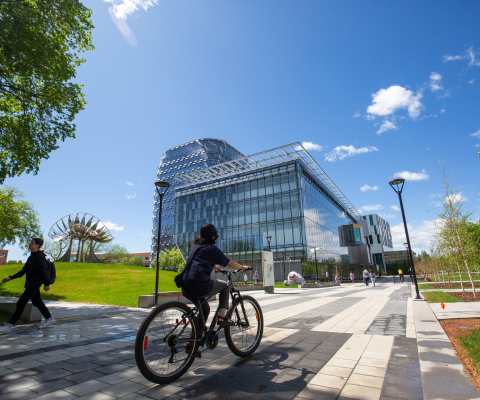Making a difference for an inclusive future

Universities are shaping students to be inclusive, collaborative and innovative leaders of tomorrow. They are partnering with communities and government, applying intentional course and curriculum design, integrating principles of equity, diversity and inclusion (EDI) into policies and practice and implementing strategic plans towards Truth and Reconciliation.
Facts and stats about Canada’s universities
73% offer Indigenous-focused programs
73% of institutions have programs that include an Indigenous specialization or focus or are specifically designed for Indigenous students.
Source: Universities Canada survey of members on Indigenous education, 2022.
90% reference EDI in strategic planning
90% of institutions reference equity, diversity and inclusion in their strategic plans.
Source: Universities Canada survey of members on EDI, 2022.
53% have female leadership
Among university leadership, 53% identify as female and 2% as non-binary, gender fluid, trans-gender or two-spirit. 3.3% identify as Indigenous, 15% as part of a racialized group, 10% as from the 2SLGBTQIA+ community and 7% identify as a person with disabilities.
Source: Universities Canada survey of members on EDI, 2022.
Promoting Truth and Reconciliation through education
As an important step toward Truth and Reconciliation, universities have begun integrating compulsory education about Indigenous histories and cultures into their programs. The University of Winnipeg, Lakehead University and Trent University were among the first to implement mandatory Indigenous education courses, with others like Brandon University implementing the requirement starting this fall. Indigenous content provides students important insights into the histories, perspectives and current realities of Indigenous peoples in Canada, while three quarters of students reported that it also enriched their university experience (according to The Canadian University Survey Consortium 2021 survey of graduating students).
Universities are also offering new Indigenous-focused degrees, such as the University of Lethbridge’s new diploma in Indigenous governance and business management, which offers learners a solid business founding and understanding of Indigenous economic and cultural issues.
Supporting representation of Black and marginalized communities
Universities are champions of inclusion and know it’s an integral part of a just and equitable society. From initiatives like Acadia University hiring Indigenous and Black faculty members and Simon Fraser University looking to hire 30 Black faculty and staff, to dedicating campus spaces for students from marginalized backgrounds, universities are working hard to create equitable systems on their campuses.
Universities are also tackling greater equity issues in society, such as the lack of diverse representation among health care professionals. A diverse medical workforce is better equipped to understand diverse cultural backgrounds and beliefs, leading to improved patient-doctor relationships and better patient outcomes. Knowing this, McGill University introduced initiatives to support Black medical school applicants, resulting in a 400% increase in Black medical students at McGill. Similarly, the University of Toronto introduced an award for Black medical students studying at the Temerty Faculty of Medicine.
Empowering the 2SLGBTQIA+ community
Empowering individuals and communities, like those who identify as 2SLBGTQIA+, is a priority for Canadian universities. Seemingly simple measures, like McGill University’s introduction of gender marker X and the University of Windsor’s released guide to pronoun usage help empower members of the 2SLGBTQIA+ community and promote respectful language.
University students also lend their expertise and knowledge in support of the 2SLBGTQIA+ community. Law students from Thompson Rivers University, for example, created a 176-page guide to aid 2SLGBTQIA+ community members navigate the legal system. A pro bono law clinic at the University of New Brunswick, filled all its available appointments after launching a program to help trans- and gender-diverse individuals change their legal names and gender markers.
About Universities Canada
Universities Canada is the voice of Canada’s universities at home and abroad, advancing higher education, research and innovation for the benefit of all Canadians.
Media contact:
Lisa Wallace
Assistant Director, Communications
Universities Canada
[email protected]
Related news
-

New report shows Canadian universities’ commitment to climate action
-

Canada's universities welcome significant investments in research, students and mental health in Budget 2024
-

BCDI 2030 launches second round of funding for scholarship projects for study in Canada
-

Urgent action for our publicly-funded universities critical to Canada’s economic stability and growth
